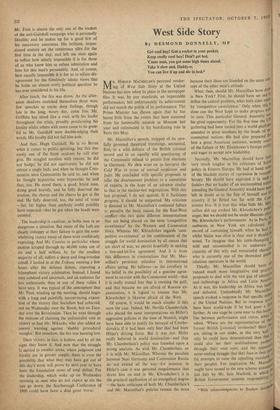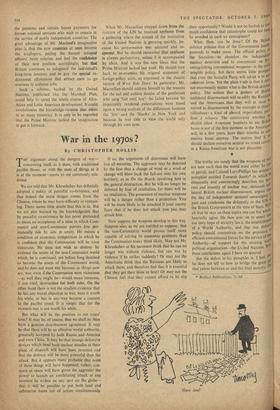West Side Story
By DESMOND DONNELLY, MP Get cool boy! Got a rocket in your pocket, Keep coolly cool boy! Don't get hot, 'Cause man, you got some high times ahead, Take it slow and, Daddy-of You can live it up and die in bed.* MR. HAROLD MACMILLAN'S personal render- ing of West Side Story at the United Nations has now taken its place in the newspaper files. It was, by any standards, an impeccable performance; bin unfortunately its achievement did not match the polish of its performance. The Prime Minister has shown again that he has learnt little from the events that have stemmed from his lamentable mission to Moscow last year and culminated in his humiliating role in Paris this May.
Mr. Macmillan's speech, stripped of its care- fully groomed theatrical trimmings, amounted, first, to a wild defence of the British colonial record and to an equally wild questioning of the Communist refusal to permit free elections in Germany. fie then went on to interpret the Cold War in terms of mutual suspicions and fears. He concluded with specific proposals to refer the disarmament problem to a committee of experts, in the hope of an advance similar to that in the nuclear-test negotiations. With this last proposal, I do not quarrel. If it facilitates progress, it should be supported. My criticism is directed to Mr. Macmillan's continual failure tc perceive the basic reason for the East-West conflict—the two quite different interpretations that are being placed on the term 'competitive co-existence' by the Western and Communist blocs. Whereas Mr. Khrushchev regards 'com- petitive co-existence' as the continuation of the struggle for world domination by all means that are short of war, we persist hopefully in seeking a live-and-let-live agreement. And it is from this difference in connotations that Mr. Mac- millan's persistent mistakes in international affairs spring. He believes—as the corollary to his belief in the possibility of a genuine agree- ment to co-exist with the Communist world—that it is really mutual fear that is creating the gulf; and that because we are afraid of Russian ex- pansionism, it is logical to assume that Mr. Khrushchev is likewise afraid of the West.
Of course, it would be much simpler if this were the case. Indeed, Mr. Neville Chamberlain, who placed the same interpretations on Hitler's aggressive policies at the time of Munich, might have been able to justify his betrayal of Czecho- slovakia if it had been only fear that had been Hitler's driving force. But it was not. Hitler really believed in world domination—and thus Mr. Chamberlain's policy was founded upon a wrong analysis. As with Mr. Chamberlain, so it is with Mr. Mkmillan. Whereas the parallels between Nazi Germany and Communist Russia do -not extend all the way—for instance, in Hitler's cast it was personal megalomania that drove him on and in Mr, Khrushchev's it is the practical application of an evangelical dogma —the basic criticisms of both Mr. Chamberlain's and Mr. Macmillan's policies remain the same because their ideas are founded on the same con' cept of the other man's attitude. What; then, should Mr. Macmillan have clone in New York? First, he should have set out t°' define the central problem, what both sides mean by 'competitive co-existence.' Only when this it done can the West hope to make progress with its case. This particular General Assembly W his great opportunity. For the first time the UP gathering had been turned into a world platform attended in great numbers by the heads of °el' committed nations. 'He had also prepared fOf him a great American audience, acutely aware of the failure of Mr. Eisenhower's foreign palicIfi and eager to accept new leadership.
Secondly, Mr. Macmillan should have bail very much tougher in his criticisms of Soviet policy in Eastern Europe. He had at hand some of the blackest stories of repression in recorded history. He should have exploited it in such 3 fashion that no leader of an uncommitted natio° attending the General Assembly would have bell: left in doubt as to the fate of himself and hi, country if he flirted too far with the 01111 rnunist bloc. It is true that what little Mr. Mac:1 millan did say evoked Mr. Khrushchev's anger, but we should not be under illusions abo, ' Mr. Khrushchev's performances. As in Paris, Ii outbursts in New York are calculated. 14P record of containing himself, when he had to whilst Stalin was alive is clear and it should °1 noted. To imagine that his table-thumping i wild and uncontrolled is to underrate twi capacity of this wily and resourceful characte who is currently one of the shrewdest Public* relations operators in the world. Thirdly, Mr. Macmillan should have adl vanced much more imaginative and practi3. proposals to deal with the vast gap of educa11° and technology in Africa and Latin Ameril As it was, his leadership on Africa was ladel and defeatist. Undoubtedly Mr. Maw-0141.n, speech evoked a response in that specific settlo at the United Nations. But its response Otlie have been world-wide if he had gone a lift„ farther. At one stage he came near to this ball(' line between performance and vision, when 4 asked, 'Where are the representatives of 11.1', former British [colonial] territories? Here theIj are, sitting in our midst, in this very hall' he only he could have demonstrated then that could also see their multitudinous problertii through their own eyes; and the apparcli.o, never-ending struggle that they face in their P°01 ful attempts to raise the appalling standards„0 their peoples. For inspiration Mr. Macnitj might have turned to the new scheme annotow Olt last July by Mr. Iain Macleod, in whic-
h
British Government assumes responsibility ' * With acknowledgments to Stephen Sondhei0 the pensions and certain bonus payments for former colonial servants who wish to remain in the service of newly independent countries. The great advantage of Mr. Macleod's imaginative plan is that the new countries at once become the employers, paying the former colonial officers' basic salaries, and feel the confidence of their new position accordingly; but that Britain continues to safeguard the individual's long-term interests and to pay the special in- ducement allowances that attract men to go overseas to arduous jobs.
Such a scheme, backed by the United Nations, publicised like the Marshall Plan, could help to speed the whole course of Afro- Agian and Latin American development. It could revolutionise the knowledge-vacuum that exists in so many countries. It is only to be regretted that the Prime Minister lacked the imagination to put it forward. When Mr. Macmillan stepped down from the rostrum of the UN he received applause from a gathering where the stature of the institution of the United Nations is growing quickly, be- cause his performance was admired and re- spected. But he should remember that applause is always perfunctory, unless it is accompanied by ideas. And it was the new ideas that the Prime Minister lacked last week. He should turn back to re-examine his original statement of foreign-policy aims, as expressed in the theatre version of West Side Story. In particular, Mr. Macmillan should address himself to the reasons for the sad and sudden demise of the gentleman who sang 'Get cool boy'—he failed because his impeccably rendered exhortations were based upon a wrong analysis of the differences between the 'Jets' and the 'Sharks' in New York and because he was able to view the world only through his own eyes.











































 Previous page
Previous page